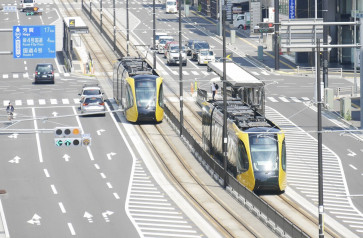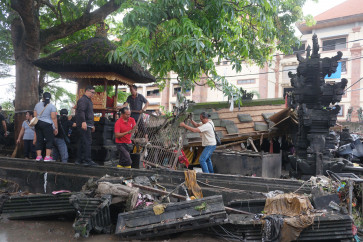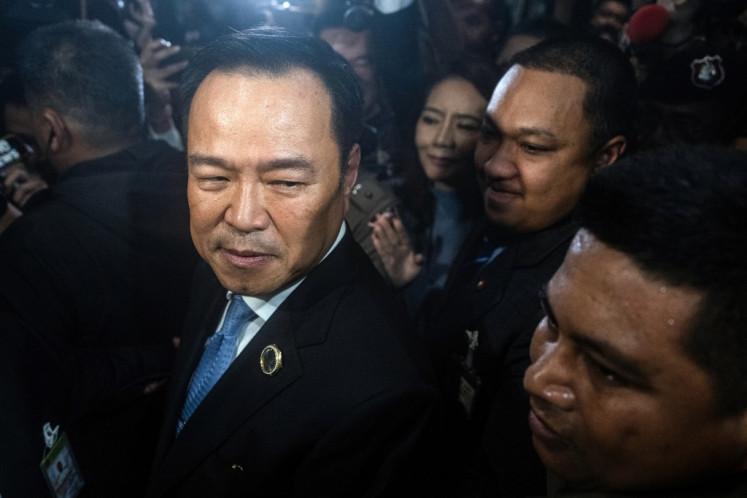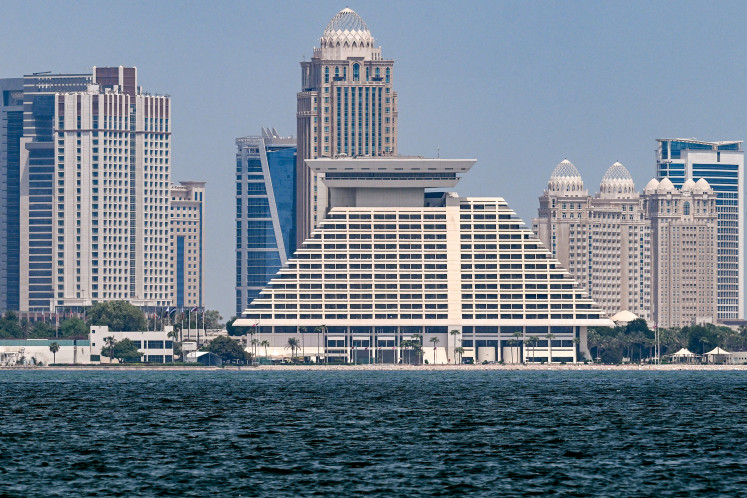Popular Reads
Top Results
Can't find what you're looking for?
View all search resultsPopular Reads
Top Results
Can't find what you're looking for?
View all search resultsOrang Rimba: Fast-breaking in the forest
On the edge: Orang Rimba are increasingly marginalized as land is encroached upon by mining projects and development
Change text size
Gift Premium Articles
to Anyone
O
span class="caption" style="width: 398px;">On the edge: Orang Rimba are increasingly marginalized as land is encroached upon by mining projects and development. JP/Elviza DianaRubber plantations cover the buffer zone or hompongan of Orang Rimba community leader Temenggung Tarib, who lives near the southern part of Bukit Duabelas National Park (TNBD).
Many Orang Rimba, also known as Anak Dalam, grow sweet potatoes in the area as well.
One hundred and twenty Orang Rimba families living around TNBD have opened up more than 100 hectares of hompongon in order to limit external pressures on the park and prepare for the future.
The buffer zones strengthen the Orang Rimba’s rights in the area, and Tarib enjoys the economic benefits from his plantations.
His perseverance in working with fellow Orang Rimba has helped to establish their presence in the area, allowing the marginalized tribe to be accepted in the plural social environment in the area.
Seventy-five families of different ethnicities and religions live on the fringes of the park — in Air Panas in Sarolangun regency — and they say living there was their choice, as is their faith.
Now a Muslim, Tarib has fasted during Ramadhan for the past two years. Acknowledging that fasting was part of his practice of Islam, he said he was still learning.
“Last year I only managed to finish 10 days and this year I hope I can make it the whole month,” Tarib said.
He doesn’t ignore his plantations while fasting. At 6 every morning, Tarib, whose Muslim name is Muhammad Jailani, begins walking to his hompongan, which is over 10 kilometers away.
On the eleventh fasting day of the month he wanted to break his fast in the park’s rubber plantation, even though his son Mandum, who is also Muslim, advised against it.
“He said I wouldn’t know the exact fast-breaking time in the woods,” Tarib said.
Instead, Tarib observed the flashes of luminescent fireflies as an indication of the right moment to break his fast amid rubber trees. He savored a bowl of his favorite kolak, sweet potatoes cooked in coconut milk and palm sugar, as fireflies emerged in the forest.
Apart from fasting, Tarib also joins tarawih and witir, or Ramadhan evening prayers, at the only mosque in Air Panas together with his wife Induk Hadijah Sangul and fellow Muslims. Tarib has also learned several verses of the Koran by heart.
Tarib and the other Orang Rimba in the area, who live several kilometers from farmland, oil palm estates and migration settlements, maintain their identity as Orang Rimba while selectively adapting in order to survive.
They have felt it necessary to abandon their nomadic lifestyle and have converted to Islam, in part for greater acceptance in the community.
The changes experienced by Tarib and other Orang Rimba, according to conservation group KKI Warsi anthropologist Robert Aritonang, are forms of adaptation to new patterns of living.
“The Orang Rimba’s ancestral belief is called basale, a kind of animism with a number of gods and rituals using various flowers known as babale. Their decision to choose a religion constitutes a communal awareness and a stage in their bid for external recognition,” he said.
Historically, the relations between Orang Rimba and other ethnic groups in Jambi were limited by taboos, thus restricting contact between them.
A rapid phase of transformation has recently been triggered by the Orang Rimba’s increasing loss of forestland through conversion into settlements, estates and mining areas, thus entailing changes in culture and living patterns.
“Predictably the changes are noticeable in crop planting instead of hunting, building houses instead of roaming, adopting a religion and also in speech. The things most likely to remain are their customs, marriage traditions and communal methods of case settlement,” Robert said.
Meanwhile, in some regions like Singkut, Sungai Tabir and Batang Bungo, the same external developments have taken place. But, local Orang Rimba did not adapt and maintained their nomadic and hunting methods, thus reduced to a form of second-class citizen in those areas, he said.










